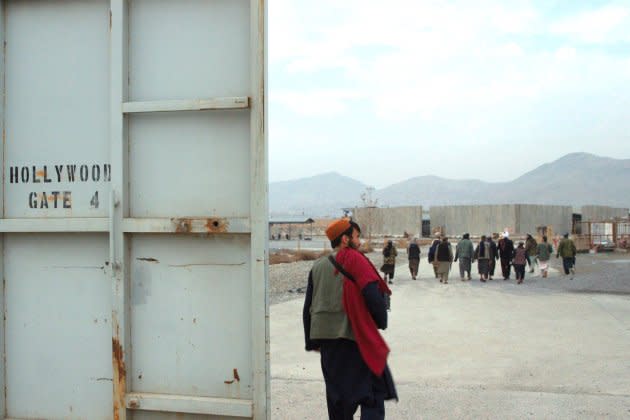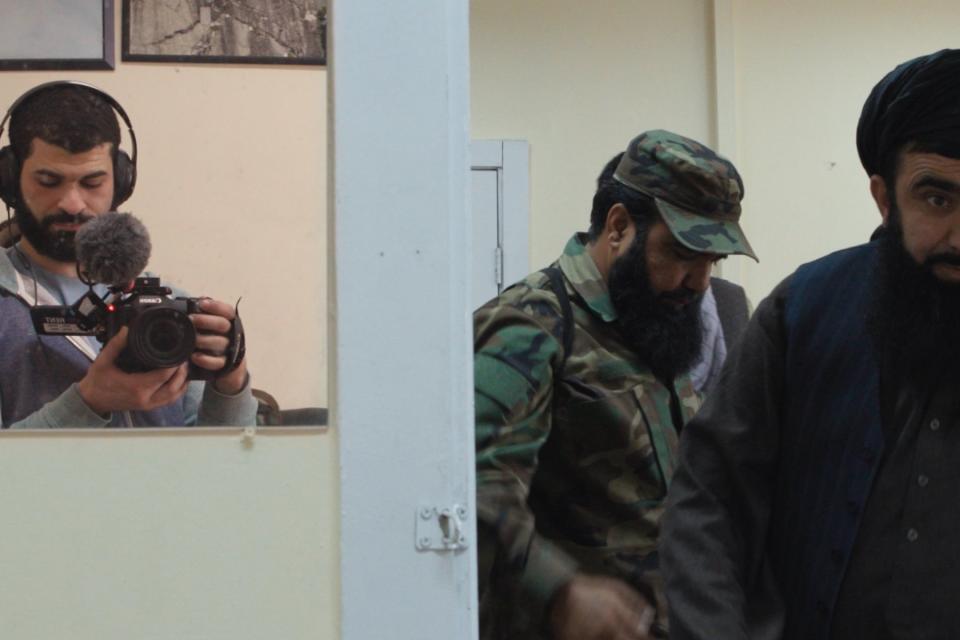A Rare, Behind-the-Scenes Look at the Taliban — and Their U.S. Weapons

A Taliban air force commander walks into a big, empty gym with his men and hops onto a treadmill. He burns a few calories, cracks a couple of muted jokes, and steps off before lifting a couple of dumbbells. “This was fun,” he says without affect, and moves on to bigger things, like figuring out how to use some of the more than $7 billion worth of American weaponry left behind when U.S. forces left the country. Hannah Arendt was writing about Adolf Eichmann when she waxed philosophic on “the banality of evil,” but the phrase works just fine for this scenario as well.
The scene comes from Hollywoodgate, which had its world premiere Thursday at the Venice Film Festival. This is a quietly sardonic documentary that essentially trades immediacy and access for context, not that it needs much more additional information. Egyptian filmmaker Ibrahim Nash’at was given permission to shoot the air force commander, a Taliban named Malawi Mansour, and his men with the caveat that he keep the focus on them and not the significant hardship civilians face under current Taliban rule. Yes, after 20 years of War on Terror, Afghanistan is run by…the Taliban. But the U.S. didn’t just leave; they were nice enough to leave massive stockpiles of machine guns, Black Hawk helicopters, and other destructive goodies for the new/old regime. At one point, as two Taliban try out one of their new guns, one of them reads the manufacturing label aloud: “Made in the U.S.A.”
More from Rolling Stone
'How To With John Wilson' Says Goodbye in Sweet, Heartbreaking Fashion
'Poor Things' Director Talks Emma Stone's Weird, Wild Sex Scenes

We never see Nash’at during the course of the film, but his subjects sure do. “If his intentions are bad, he will die soon,” Mansour says at one point. No pressure. “That little devil is filming us,” says another soldier later on. “I hope he doesn’t bring us shame.” The Taliban are looking for an advertisement for what they see as their awesomeness, a calling card announcing that the boys are back in town. It’s hard to say if they would even object to the final product.
Hollywoodgate, which takes its name from the abandoned CIA base in Kabul that Mansour and his men take over, is studiously objective in its approach; Nash’at films what is in front of him, or at least what he is allowed; more than once he is ordered to turn his camera off. The film’s effect comes from the access, the editing, and the disconnect between how the Taliban think they come across, as righteous liberators, and what we see, a gang of insecure bullies who scoff at the idea of their wives working and compare a woman with an uncovered face to a piece of chocolate that has been dropped on the ground.
This is not a combat film; the central action, a battle between the Taliban and a group of insurgents, is vaguely described, not shown. But given the imposed restrictions, Nash’at manages to provide a rare glimpse of an unusual transfer of power from the vantage of those claiming the throne. We hear the filmmaker’s narration only twice, at the beginning and the end. He says he wanted to show “the obscene power of those who worship war, and the pain that it causes for generations.” I wouldn’t have minded hearing him pipe up a bit more and comment on a little of what we’re looking at, even at the expense of breaking the film’s you-are-there spell. Hollywoodgate throws us in the deep end and compels us to swim. For the most part it’s worth the effort.
Best of Rolling Stone

